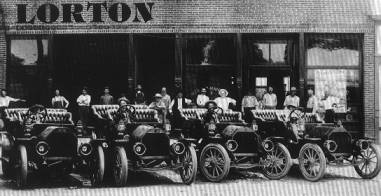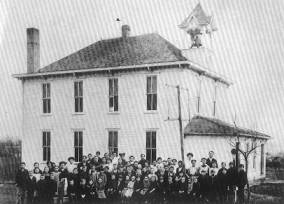 LORTON
-- OTOE COUNTY LORTON
-- OTOE COUNTY
Platted in 1881, our town was given the name
"Delta." Its post office was established on June 26,
1882. When the Missouri Pacific Railway built a
north-south
connecting line from Talmage to Weeping Water, it came
right
through Delta.
While establishing the right-of-way, however,
railroad
officials informed the town that its name had to be
changed since
it had a station by that name in Kansas. While
everyone was happy
to get a railroad, no one wanted to change the name of
the town,
so no action was taken. The railroad -- determined in
their
decision -- chose its own name for the station,
calling it
"Cio."
For several years, the town had two names. The post
office had
no problem with the original name, since the other
Delta was in
another state. Mail was addressed to Delta, but
freight had to be
directed to Cio. When traveling, passengers also had
to remember
to identify their destination by its station name --
not that of
the town. This was obviously a very confusing
situation.
In time, the people decided to find a name that would
be
acceptable to all. Robert Lorton, a wholesale grocery
salesman
from Nebraska City who called on local merchants at
that time,
was well-liked, and since there were no other towns by
that name
in Nebraska or on the MP line, the people chose the
name
"Lorton." On November 6, 1894, the name -- approved by
both the federal and railroad authorities -- was
officially
changed.
 During its
first 25 years, Lorton was a thriving railroad town,
with four
trains a day. The 1900 census lists the village with a
population
of 290. There was a Baptist church, an opera house, a
hotel, a
bank, a doctor's office, a blacksmith shop, two
grocery stores
(one with general merchandise), a pharmacist, a
hardware store, a
lumberyard, a livery stable, two taverns, a millinery
shop, a
dressmaking establishment, a harness shop, two
elevators, and a
stockyard. During its
first 25 years, Lorton was a thriving railroad town,
with four
trains a day. The 1900 census lists the village with a
population
of 290. There was a Baptist church, an opera house, a
hotel, a
bank, a doctor's office, a blacksmith shop, two
grocery stores
(one with general merchandise), a pharmacist, a
hardware store, a
lumberyard, a livery stable, two taverns, a millinery
shop, a
dressmaking establishment, a harness shop, two
elevators, and a
stockyard.
Because of its location away from major east-west
routes,
Lorton became pretty-much a self contained community.
At one
time, over 60 children were enrolled in Lorton's
school. As roads
improved, and the economy of the state and nation
changed, the
need for the railroad and railroad-towns diminished. A
number of
businesses that closed during the 1930s and World War
II did not
reopen. When the 1950 flood washed out the tracks, it
ended train
service to Lorton and the elevator closed.
Today, Lorton has a population of 45. The post office
is
located in the grocery store, and we have a garage and
repair
shop, a tavern, and the Otoe County bridge equipment
storage
building. The town board, Chairman Ricci Landwehr, and
members
Judy Teten, David Goeden, Howard Hogankamp, and Lela
Goeden, meet
regularly at the town hall to provide for the needs of
the
citizens.
For many years the young people moved away to find
employment
in larger towns. Recently, younger families with small
children
have moved to Lorton. Now, as the older citizens move
away, new
people are purchasing homes and taking an interest in
the
small-town life.
This is giving new life to our town, and helps Lorton
to grow
again.
By Norma J. Castle, Village Clerk, Lorton, NE 68382.
|

